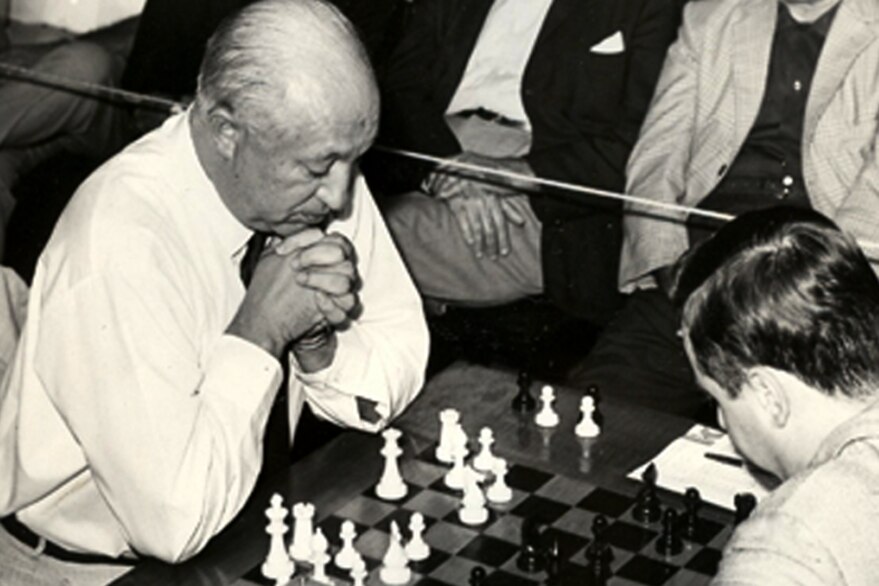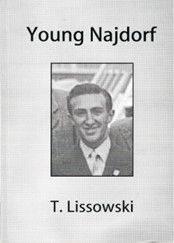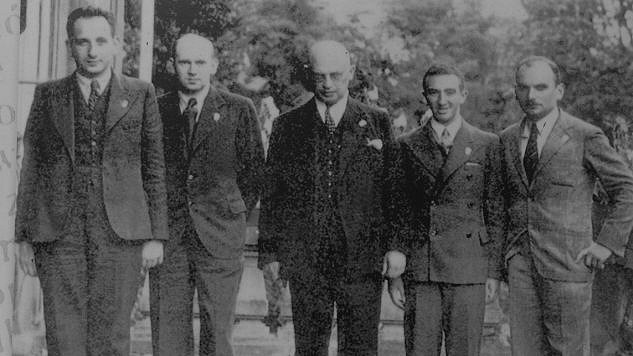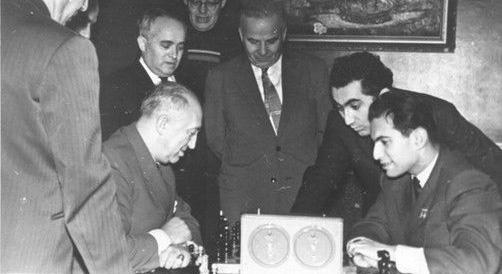


 Josik had gone out for a few minutes, on an errand. Miguel knocked on the door. Only Mr. Friederbaum, his friend’s father, apparently with a cold, a violinist for the Warsaw Philharmonic, was at home.
Josik had gone out for a few minutes, on an errand. Miguel knocked on the door. Only Mr. Friederbaum, his friend’s father, apparently with a cold, a violinist for the Warsaw Philharmonic, was at home.
Miguel came in. To make conversation, the providential violinist asked him if he knew how to play chess — and got upset when the visitor confessed that he did not. He showed him a chessboard. He told him about the pieces, the queen, the jumping knights, the sturdy rooks, the pawns which always serve as bait. And he also showed the young boy the flowing movement of the cunning bishop, and told him about the king’s solemnity and pride.
A week later the violinist could no longer beat him.
In the early days it was hard for me. My mother even burnt chessboards, books and pieces. Everything. She said that I was possessed, that chess was taking up all my time. She wanted me to become a doctor. I didn’t become one, but now I have two daughters who are doctors. It’s a way of indulging her, isn’t it?
A week later he was already turning into the Miguel Najdorf that we all know today, even though he was only 9 years old.
He was born in Warsaw on 15 April 1910. He has just turned seventy-eight. I warn you that the story told above will perhaps be the last real victory of our protagonist. His nomadic life was anything but orderly. The Great War barely impacted his childhood sensibility, he finished his studies in mathematics, at 18 he won his first international tournament, he was the third board for Poland in the 1935 Olympiad, he got married, he had a daughter. A wholesome life.

The Polish team at the 1935 Chess Olympiad 1935 — Najdorf is second on the right
I was born twice, without having ever died.
His second life began in Buenos Aires in the late winter of 1939. He arrived as second board of the Polish team, to play in the Olympiad, and a few days later, on 1 September, Hitler invaded Poland.
My wife was there, she couldn’t travel with me because of the flu. My three-year-old daughter was there too. My parents, my four brothers and sisters, cousins, aunts and uncles...
What did you do? How did you feel?
I felt everything and I could do nothing, almost nothing. For years, I used chess to gain hope — I played, I gathered money, I thought that if I became famous someone in Poland might find out, someone from my family. I went into the insurance business, but I also sold ties, I sold candy, whatever I could sell. In 1946, I returned to Warsaw. There was nobody there. Everyone had died in the Nazi gas chambers. My little daughter too.
Don Miguel, how could you go on living?
Fighting, I think. I went to New York, I had a great uncle in the Bronx. I took the metro and saw a guy reading a Polish newspaper, I went up to him, I talked to him, he had been in a concentration camp. He was from a small town near Warsaw. I had so many relatives that some of them lived in that town, we kept talking, and it was incredible: he had married a first cousin of mine. I remember as if it was today, we got off in Harlem, we went to a café. We were the only white people there, we looked at each other and we both cried.
Did you ever go back to Warsaw?
Many times...
Has it changed? What do you feel when you see it?
Everything has changed, now I feel and think like an Argentinean.

Fidel Castro, Oscar Panno and Miguel Najdorf
His clear eyes hold my gaze, he has never resigned himself to defeat. His probity dazzles — I had that written in my notes and I can see it now, in front of me. There are papers on his insurance executive’s desk, two cups of coffee and one of tea, a telephone, folders, ashtrays. And a chessboard, magnetic, next to the window, to his left. And a portrait, of Capablanca and Alekhine.
Go ahead, ask — what else do you want to know? I’ll help you, I’m a journalist. Do you read my column in Clarín?
Of course, of course. I want to ask you — why Capablanca?
Because he was the greatest, he and Bobby Fischer. Capablanca was a child prodigy, at the age of 6 he was national champion of Cuba and at 13 he was national champion of the United States. A genius, a super-genius.
National champion playing against adults?
Of course, a genius. He had a gift of nature. He was born in 1888, a hundred years ago, and I’ve just been invited to a memorial tournament they do every year. I won the first edition.
Did you know him well?
Yes, I’m the only active player who played with him. He had an exceptional eye, he knew how to play and how to live.
But they say that...
Yes, I know, and it’s true, his lifestyle got the better of him, he was defeated by bohemia and his own defects. When he played the famous match with Alekhine here, he spent his free hours playing poker at the Jockey Club and eating puchero* at El Tropezón until early morning.
[* Ed.- A hearty Argentinian meat and vegetable stew typically eaten during the colder months of the year.]

Miguel Najdorf playing blitz against Mikhail Tal, with Tigran Petrosian and Salo Flohr kibitzing
What about Alekhine?
Also one of the greats, of course, with a prodigious memory. He was a drunk, he used to go into the Chantecler on Paraná Street and never came out. Later, he became a Nazi opportunistically. When he died, a tribute was paid to him during the Mar del Plata tournament, and I was the only one who didn’t stand up to commemorate his life. I couldn’t.
Tell me, are all chess players drinkers and womanizers?
Most of them. It’s a necessary escape for intellectuals.
Not you, of course.
Me? No, of course not...nowadays.
He interrupts me, he jumps from one subject to another, he asks me how old I am. “Forty-two? A kid, just like my daughter”. He’s already let out the first frisky laugh. He’s already put off two phone calls. “Do you know how to play chess?” I sense fleeting disappointment at my answer. “Go ahead, ask me, I’m a journalist too.”
Could a man like Capablanca be the champion today?
No, all chess players are geniuses, so now the one who is more focused, more disciplined and in better shape physically wins. Now you have to work full time. You can’t compare Einstein with Aristotle, but in chess professionalism makes a difference. The one who doesn’t study, and leads a bad life...
Bad?
Good. Bad for chess.
The shock provoked by the invasion of his homeland, the pain, the abrupt changes, could not defeat him either. He sold his ticket back to Warsaw for 300 dollars, and he used that money to start his second life “without having ever died”, as he says. He played at the Politeama Theatre, and Capablanca invited him to live in Havana, where he would write a chess column for the newspaper La Marina.
But I listened to Roberto Grau. He told me, “Miguelito, this country is paradise”. I had met another Pole here. I asked him how he was doing. He said, “Fine, puchereando”. We were living at the City Hotel and I did not understand what he meant, but when I found out, I had no doubts. I thought, it must be a good country, in Poland we say, “Here I am, earning my bread”. Puchero is much more than bread. I stayed.
Do you speak lunfardo?
I love it, I speak it in the café, when I go to play.
Where do you play?
At Lavalle and Maipú, or at the Richmond, or at the Club Argentino. I play a few games every afternoon.
To be continued...
Translation from Spanish: Carlos Colodro